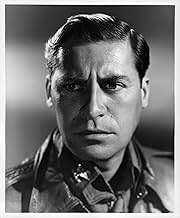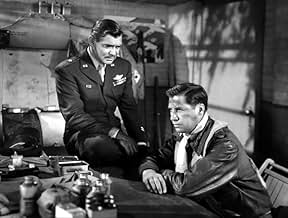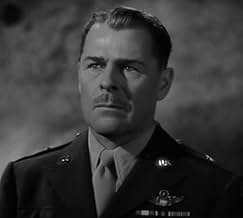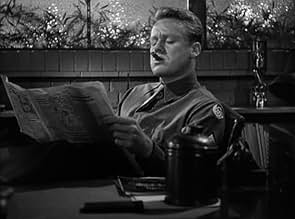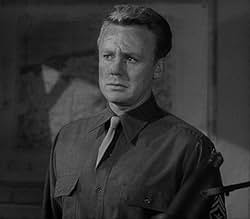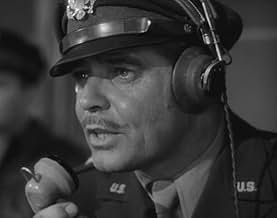NOTE IMDb
7,3/10
2,2 k
MA NOTE
Ajouter une intrigue dans votre langueArmy generals struggle with the decision to prioritize bombing the German factories producing new jet fighters over the extremely high casualties the mission will cost.Army generals struggle with the decision to prioritize bombing the German factories producing new jet fighters over the extremely high casualties the mission will cost.Army generals struggle with the decision to prioritize bombing the German factories producing new jet fighters over the extremely high casualties the mission will cost.
- Réalisation
- Scénario
- Casting principal
- Récompenses
- 3 victoires et 2 nominations au total
Avis à la une
I found an old tape of Command Decision which I must have made 20 years ago. I concur with all those who have said that it is one of the best WW2 films ever made, but what struck me most forcefully was the fact that this highly intelligent, gripping and thoughtful film was made with a large crew of established filmstars by a completely commercial film studio. It brought home to me forcibly what was lost when the old studio system broke up and the sheer craftsmanship which it embodied was dispersed. The sheer childishness of most current films becomes even more evident.
Writing as one who lived through the bombing of Britain, the historical perspective on the Allied wartime bombing campaign was fascinating. One small complaint--all film coverage of the American campaign in WW2 seems to focus on the Flying Fortress. Actually, most of the bombs were dropped by the Consolidated Liberator squadrons--less photogenic but more effective!
Writing as one who lived through the bombing of Britain, the historical perspective on the Allied wartime bombing campaign was fascinating. One small complaint--all film coverage of the American campaign in WW2 seems to focus on the Flying Fortress. Actually, most of the bombs were dropped by the Consolidated Liberator squadrons--less photogenic but more effective!
In a larger sense "Command Decision" is not really a war movie but a film about the responsibility of command and leadership. It is one of the few films that effectively explores these topics; and belongs right up there with the original "Flight of the Phoenix" and "The Red Tent". Not having the visual power of those two films (the limited combat/action scenes are almost entirely stock footage), it must focus more narrowly on the human complications arising from the responsibility of command. The contradiction being that while a leader must cease to be human, no one who can do this is fit to be a leader.
Adapted from a stage play, "Command Decision" suffers from a fair amount of "long-windedness". Fortunately the most long-winded character (Major General Kane-played by Walter Pigeon), is well written and has many substantial things to convey. Much like his character in "Forbidden Planet", Pigeon is tasked with inserting historical and philosophical details into the story, and his commanding screen presence makes him ideal for this purpose.
Brigadier General K.C. Dennis (Clark Gable) has the most screen time and most challenging role, as his character is the guy stuck between a rock and a hard place. He is accountable for making the hard decisions that send his men off to die, but has a fragile authority dependent on how much independence his superiors are allowing him at a particular point in time. Gable does fine in this part, probably his best totally "serious" performance. Although the film takes pains to use the German high command to illustrate examples of bad leadership, it is easy to infer that the same mindset applies to the Allies. With many military leaders distorting events to cover their own ass and willing to sacrifice men for their own career advancement and personal ideology.
The premise of the film is the Air Corps discovery that the Germans have developed the first jet combat plane. Based on the real life Messerschmitt Me-262 (shown as a model in the film and in some archival footage), it is called the "Lantze-Wolf" here and considered so effective as a fighter aircraft that full production would allow the Luftwaffe to regain air supremacy over Europe.
The planes are being assembled in three cities deep in Germany. The only hope to delay their full production is "Operation Stitch" (named for its goal of gaining a stitch in time), a plan to attack these sites through dangerous daylight bombing raids. Dangerous because they will be heavily defended and because the bombers will have to go the final hundred miles without fighter escort-since the America fighters do not have the range to reach and return from the target. This type of daylight bombing was called precision bombing because the bomb-site was more effective with better visibility and a lower altitude. The alternative was safer but less accurate saturation bombing at night (insert Dresden here).
General Dennis must decide whether to start the operation, and then when the bombers take substantial punishment he must decide whether to continue in the expectation of additional high losses.
The film takes certain historical liberties as only after a postwar evaluation of the actual ME-262 did anyone really understand its strategic potential (in the hands of well trained pilots) as a fighter aircraft. Until the end Hitler insisted that it be utilized almost exclusively as a bomber. Although able to carry out this alternative role, its bomb load capacity was too little for any significant impact. That the ME-262 is more a footnote to the war than a major element was due more to Hitler's decision than to any allied efforts to limit its production.
Then again, what do I know? I'm only a child.
Adapted from a stage play, "Command Decision" suffers from a fair amount of "long-windedness". Fortunately the most long-winded character (Major General Kane-played by Walter Pigeon), is well written and has many substantial things to convey. Much like his character in "Forbidden Planet", Pigeon is tasked with inserting historical and philosophical details into the story, and his commanding screen presence makes him ideal for this purpose.
Brigadier General K.C. Dennis (Clark Gable) has the most screen time and most challenging role, as his character is the guy stuck between a rock and a hard place. He is accountable for making the hard decisions that send his men off to die, but has a fragile authority dependent on how much independence his superiors are allowing him at a particular point in time. Gable does fine in this part, probably his best totally "serious" performance. Although the film takes pains to use the German high command to illustrate examples of bad leadership, it is easy to infer that the same mindset applies to the Allies. With many military leaders distorting events to cover their own ass and willing to sacrifice men for their own career advancement and personal ideology.
The premise of the film is the Air Corps discovery that the Germans have developed the first jet combat plane. Based on the real life Messerschmitt Me-262 (shown as a model in the film and in some archival footage), it is called the "Lantze-Wolf" here and considered so effective as a fighter aircraft that full production would allow the Luftwaffe to regain air supremacy over Europe.
The planes are being assembled in three cities deep in Germany. The only hope to delay their full production is "Operation Stitch" (named for its goal of gaining a stitch in time), a plan to attack these sites through dangerous daylight bombing raids. Dangerous because they will be heavily defended and because the bombers will have to go the final hundred miles without fighter escort-since the America fighters do not have the range to reach and return from the target. This type of daylight bombing was called precision bombing because the bomb-site was more effective with better visibility and a lower altitude. The alternative was safer but less accurate saturation bombing at night (insert Dresden here).
General Dennis must decide whether to start the operation, and then when the bombers take substantial punishment he must decide whether to continue in the expectation of additional high losses.
The film takes certain historical liberties as only after a postwar evaluation of the actual ME-262 did anyone really understand its strategic potential (in the hands of well trained pilots) as a fighter aircraft. Until the end Hitler insisted that it be utilized almost exclusively as a bomber. Although able to carry out this alternative role, its bomb load capacity was too little for any significant impact. That the ME-262 is more a footnote to the war than a major element was due more to Hitler's decision than to any allied efforts to limit its production.
Then again, what do I know? I'm only a child.
There must be at least one whole generation of viewers who don't even know this film exists! Yet it remains one of the very best WWII films ever made. I first saw as a child, when it was quite new, and have seen it several times since. It has never lost its hold and that, I suppose, principally because of Clark Gable's superb performance (although the other parts are all very strongly done). It really must be one of his finest screen roles and that alone, one might think, would ensure that it is never long absent from television screens. Sadly it has been shown in Britain but once that I know of, and is not available here on a PAL-system video, although "Twelve O'Clock High" is available and often screened. In many ways the two films complement each other, each not wholly to be appreciated without seeing the other. "Twelve O'Clock High" has an almost exclusively military focus while "Command Decision" brings in the effect of political factors on military decisions. The latter film, however, has an edge: Gable on top form and that was always something very special.
"Command Decision" is a wonderful film filled with several great performances. It's Gable's movie, but he's very capably supported by Walter Pigeon, Brian Donlevy and John Hodiak, who nearly equals his "Lifeboat" performance.
Pigeon is especially good in the roll of a senior commander who is more concerned with the political considerations of the war effort than the tactical and strategic goals. (Not without reason - The film correctly details the perilous and tenuous position that the 8th Air Force found itself in during the worst combat period of 1943.)
One of the best scenes in the film is a very long speech given by Pigeon, wherein he explains his reasons for fighting the good fight to keep American air power strong. The scene is a good 6 or 7 minutes long, one camera shot, entirely done without cuts. It must have been rehearsed extensively as it requires about 10 actors to interact with Pigeon at several times, all the while he is moving about the room. Seamless, and very well done! This remarkable scene is followed up with one almost as long, given by Gable.
The drama is occasionally broken up with comic moments provided by Van Johnson, as a savvy sergeant, and Clinton Sunberg as a fastidious aide to Pigeon's General Kane.
If you like to watch actors banging away with words instead of guns, this is the war movie for you.
Pigeon is especially good in the roll of a senior commander who is more concerned with the political considerations of the war effort than the tactical and strategic goals. (Not without reason - The film correctly details the perilous and tenuous position that the 8th Air Force found itself in during the worst combat period of 1943.)
One of the best scenes in the film is a very long speech given by Pigeon, wherein he explains his reasons for fighting the good fight to keep American air power strong. The scene is a good 6 or 7 minutes long, one camera shot, entirely done without cuts. It must have been rehearsed extensively as it requires about 10 actors to interact with Pigeon at several times, all the while he is moving about the room. Seamless, and very well done! This remarkable scene is followed up with one almost as long, given by Gable.
The drama is occasionally broken up with comic moments provided by Van Johnson, as a savvy sergeant, and Clinton Sunberg as a fastidious aide to Pigeon's General Kane.
If you like to watch actors banging away with words instead of guns, this is the war movie for you.
This is one of the best WW2 movies. The acting and writing are superb and rather subdued at that. With Clark Gable you expect BIG ACTING AND BIG ACTION but in this one he does a very credible job portraying a very troubled man who is put in charge of the bombing campaign against the Germans. So, this movie is a bit of a stretch for the usually glib Gable, as it focuses on the emotional toll of war.
The movie is VERY similar to the great 12 O'Clock High (starring Gregory Peck). 12 O'Clock is a slightly better movie (and it gives Peck more room to hash out his character as the man in charge of sending airmen to their deaths), though they are so good I recommend seeing both.
The movie is VERY similar to the great 12 O'Clock High (starring Gregory Peck). 12 O'Clock is a slightly better movie (and it gives Peck more room to hash out his character as the man in charge of sending airmen to their deaths), though they are so good I recommend seeing both.
Le saviez-vous
- AnecdotesClark Gable enlisted in the US Army Air Forces after his wife Carole Lombard died in a plane crash on a war bonds selling trip assisting the war effort. Gable went to Officers Candidate School (OCS), graduating as a second lieutenant, and was eventually promoted to major. He was trained as an aerial gunner and combat cameraman and was awarded both the Distinguished Flying Cross and Air Medal for at least five aerial bombing missions over Germany from England with the 351st Bomb Group (Heavy). Adolf Hitler personally offered a reward to the pilot or anti-aircraft gun crew who shot down Gable's plane.
- GaffesWhen General Dennis tries to talk down the bombardier flying the crippled bomber, the bombardier reports that the aircraft's fuel is exhausted. Presumably he had also dropped his bomb load over the target. His on-board supply of machine gun ammunition should be very low if not exhausted. Yet when the bomber crashes, it explodes and burns. If he has no bombs, no gas , and no machine gun ammunition, what's to burn?
- Citations
James Carwood: What's the answer, Brockie, all guts and no brain?
Elmer Brockhurst: No. That's putting it too simply. Dennis is one of those boys whose brain is fascinated by guts. He loves this lousy war.
- Versions alternativesAlso available in a computer colorized version.
- ConnexionsFeatured in Clark Gable: Tall, Dark and Handsome (1996)
Meilleurs choix
Connectez-vous pour évaluer et suivre la liste de favoris afin de recevoir des recommandations personnalisées
- How long is Command Decision?Alimenté par Alexa
Détails
Box-office
- Budget
- 2 467 000 $US (estimé)
- Durée
- 1h 52min(112 min)
- Couleur
- Rapport de forme
- 1.37 : 1
Contribuer à cette page
Suggérer une modification ou ajouter du contenu manquant


